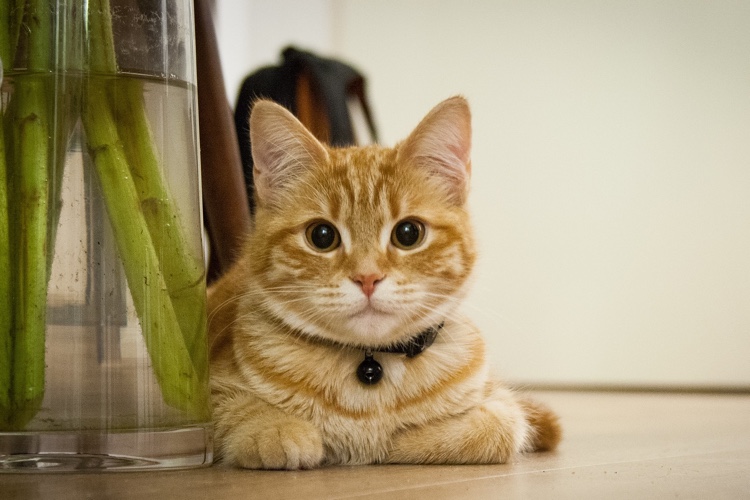
Hyperthyroidism in cats is a common endocrine disease. It can occur in any breed of cats at any age, but is more often seen in middle-aged and older felines. If you're a cat parent, it’s good to know more about this disease, especially the symptoms of hyperthyroidism in cats, since early intervention is very important.
What is hyperthyroidism in cats?
Your cat has a pair of thyroid glands in his or her neck that produces hormones to help regulate the rate of metabolism. Cats with hyperthyroidism have an issue with the thyroid glands where they release an abnormally high level of these hormones. This speeds up metabolism, which can stress your cat’s internal organs and have a serious impact on your cat’s overall health.
What are the symptoms of hyperthyroidism in cats?
The symptoms of hyperthyroidism in cats can be subtle in the early stages and may be similar to other common cat disorders, like diabetes (learn about diabetes in cats). Symptoms can become worse as the disease progresses. Those symptoms include:
- Increase in appetite (although appetite has also been known to decrease with hyperthyroidism)
- Loss of weight in spite of a strong appetite
- Rise in activity sometimes to the point of hyperactivity
- Rapid heart rate
- Increased thirst
- Frequent urination
- Vomiting
- Diarrhea
- An unkempt coat, which may also appear dull, greasy, or matted
- Behavior changes, like restlessness, not sleeping at night, or acting aggressively
If you notice any of these symptoms, you should take your cat to the veterinarian for an accurate diagnosis. The sooner your cat is diagnosed and undergoes treatment, the better. This disease can be managed or cured to help your cat live a long and happy life.
How is hyperthyroidism in cats diagnosed?
Veterinarians will typically perform a full exam of a cat suspected to have hyperthyroidism. This includes checking the heart rate, taking the cat’s blood pressure, and feeling around the neck area for enlarged glands.
They will also likely conduct a blood test to see if the cat has high levels of thyroid hormones, called thyroxine (T4) and triiodothyronine (T3). Additional tests may be needed to get an accurate diagnosis and a full picture of your cat’s health.

What are the treatment options for hyperthyroidism?
In general, there are three different options for treating hyperthyroidism in cats:
1. Medication
Hyperthyroidism in cats may be treated with medications that help stop the thyroid from overproducing hormones. These medications don’t cure the disorder, thought they do inhibit the thyroid gland, and will likely need to be need given for the rest of the cat’s life.
Fortunately, these medications are usually readily available and can be affordable depending on the cat parent’s budget. However, it still takes commitment and a financial investment to follow through with this treatment.
Some cats have side effects with these medications, such as fever, vomiting, or lethargy. If the side effects are too severe, the veterinarian may recommend another course of treatment. Routine blood tests may also be needed to track the effectiveness of the medication and the cat’s health.
2. Surgery
Some cats may undergo surgery to remove all or part of the thyroid glands. Surgery can be a cure for hyperthyroidism and avoid the need for ongoing medication. However, there are risks involved in any surgery, especially for older cats, obese cats, or cats with health issues related to hyperthyroidism or other diseases.
There are also specific risks for surgery on the thyroid. The thyroid glands are located in a crowded area of the neck, and other organs can be inadvertently damaged during the procedure. Also, if a large portion or the entire thyroid is removed, the cat will need to take thyroid hormone supplements over the course of his or her life.
3. Radio-Iodine Therapy
With this option, cats are injected with a dose of radioactive iodine. This iodine destroys overactive thyroid cells without hurting surrounding tissues. Cats who receive this treatment may go back to normal thyroid hormone levels in just a week or two.
The radioactivity isn’t harmful to the cat, but special handling is needed until it falls to an appropriate level. For this reason, treated cats are typically hospitalized for several days after the procedure.
In rare instances, the hyperthyroidism can recur, and this treatment may be repeated. There are also some cases when cats experience low levels of thyroid hormones. If this happens, a thyroid hormone supplement may be necessary.
If your cat is diagnosed with hyperthyroidism, your veterinarian can help you determine the best course of action.
What if hyperthyroidism in cats is left untreated?
Unfortunately, hyperthyroidism can be missed since cats tend to mask signs of illness or hide when they’re not feeling well (see 5 Signs Your Cat is Sick). It can also be overlooked because it often occurs in older cats who may have other health issues with similar symptoms.
Thyroid hormones affect almost all of the organs in the body. If hyperthyroidism in cats is left untreated, it can cause serious problems and even be fatal. For instance, thyroid hormones cause the heart to beat faster and contract more strongly. Over time, this can impair the normal functioning of the heart and trigger cardiac arrest.
In addition, hyperthyroidism can cause hypertension or high blood pressure, and result in damage to the eyes, kidneys, and brain. Cats with untreated hyperthyroidism can also endure pain and a lower quality of life due to the symptoms of the disease.
Diagnosis and quality treatment for hyperthyroidism in cats can be expensive, but an ASPCA Pet Health Insurance plan can help you manage the costs. It can also cover your pet for other common cat illnesses as well as accidents and injuries. Find out about cat insurance.
Helpful resources for pet parents
Browse categories
-

All About Miniature Pinschers
Miniature Pinschers may be small in stature, but they have mighty big personalities. Before adopting your own Min Pin, learn more about this German breed.
-

All About King Charles Spaniel, aka English Toy Spaniel
Affectionate, docile, and a great lap dog, there are many reasons to love King Charles Spaniels.
-

Cat Blood Disorders
With a proper diagnosis and a tailored treatment plan, your feline friend can go on to happily live their life, even with a blood disorder.

Browse Categories
(opens new window)
